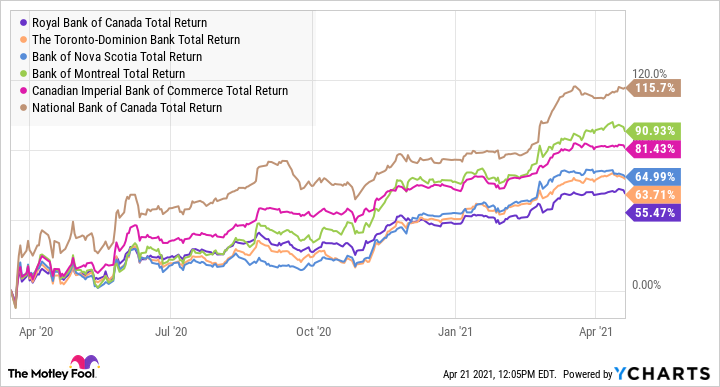Seeing the latest performance of the big Canadian banks, it’s as if the pandemic is at the back of everyone’s minds. The bank stocks have all made huge comebacks from their pandemic market crash lows and surpassed their pre-pandemic trading levels!
Total Return Level data by YCharts.
However, bank stocks are not expensive. Some investors might even be thinking of buying (more) bank shares.
Why buy the Canadian bank stocks now?
The big Canadian bank stocks are a good gauge of the health of the economy, or at least what is perceived of the economic health to come.
There was a setback last year with the nominal gross domestic product declining 4.6% in Canada, according to Statistics Canada. That is expected to be made up (and more) with expected returning jobs in the tourism and hospitality industries as well as growth in other industries.
For example, the government’s bailout of Air Canada will secure jobs at the company. Additionally, the vaccine rollout across the country can lead to more loose restrictions for business operations like restaurants.
Investors might have noticed that most of the big Canadian banks saw a meaningful reduction in their earnings last fiscal year. The reduction was due to higher provision for credit losses (PCLs), as the banks set aside more cash in expectation of higher percentages of bad loans, which, for most, did not materialize.
For example, Royal Bank of Canada’s (TSX:RY)(NYSE:RY) fiscal 2020 PCLs were $4.35 billion, up from $1.86 billion in fiscal 2019. However, the fiscal 2020 PCL ratio was 0.63% (up from fiscal 2019’s 0.31%) versus PCLs on impaired loans of 0.24% (down from fiscal 2019’s 0.27%). In other words, RBC’s PCLs on impaired loans was, in reality, lower in fiscal 2020 versus 2019! This implies that RBC’s underlying loan portfolio is of high quality.
You can do similar comparisons for your bank holdings, and you’ll see a similar picture.
In summary, the Canadian economy chugging along and being on the path of a steady recovery can be the driving force to push the Canadian bank stocks higher.
Importantly, the banks did not freeze their dividends because they had to. Once the regulators allow it, the big bank stocks will be able to restart their dividend growth again!
Why might you not buy the Canadian bank stocks now?
Any bad news to the economy could cause a selloff in the banks. For example, any delays in the vaccine rollouts or tighter restrictions on social distancing and economic lockdowns could lead to a gloomy near-term outlook of the economy. This could deter investors from putting new money in the banks.
The Foolish takeaway
At the end of the day, consider your portfolio allocation in the banks. If you already hold a decent percentage of shares in your diversified portfolio, especially if you added during the pandemic market crash last year, you would refrain from adding more now.
However, if you don’t own any bank shares, you might buy a small position at the current fairly valued levels for safe, passive income and roughly market-matching returns.
If banks don’t make up more than 15% of your portfolio, there’s no need to make any changes to your allocation in the banks.
Don’t just buy the banks. Here are other great stocks for your diversified portfolio!
The 10 Best Stocks to Buy This Month
Renowned Canadian investor Iain Butler just named 10 stocks for Canadians to buy TODAY. So if you’re tired of reading about other people getting rich in the stock market, this might be a good day for you.
Because Motley Fool Canada is offering a full 65% off the list price of their top stock-picking service, plus a complete membership fee back guarantee on what you pay for the service. Simply click here to discover how you can take advantage of this.
Fool contributor Kay Ng owns shares of Royal Bank of Canada.







